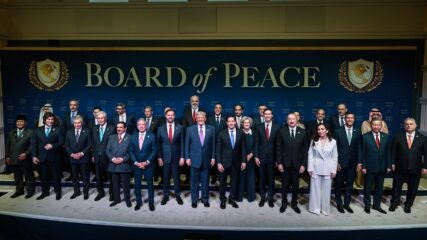From the vantage points of Amman and Damascus in the 1970s and 1980s, Patrick Theros heard the sharp political opinions deeply felt about the United States and the profound anger voiced by Arafat, Jordan's King Hussein and Syria's President Assad for each other.
Latest articles from CIE

Board of Peace Inaugural Meeting, 2026: Hamas Disarms for Redevelopment, or Gaza Returns to War
The first meeting of the Board of Peace convened under the Trump ceasefire for Gaza offers grand plans for reconstruction and a vibrant, peaceful future for Palestinians but depends on the disarmament of Hamas.

Stein: The Causes and Consequences of the 2023-2025 Hamas-Israel War (transcript)
CIE President Ken Stein addresses what is and what is not known about why Hamas attacked October 7, 2023, why Israel was caught off guard, and what happens after the war across the region.

Controversies Uncool for Israel’s Olympic “Shul Runnings”
Israel wasn’t expecting gold, silver or bronze in the 2026 Winter Olympics, but it also wasn’t expecting controversy to mar the happy story of its first Olympic bobsledders.

Evaluating the 2023-2025 Hamas-Israel War and Its Consequences (video, 44:06)
CIE President Ken Stein briefly reviews the 2023-2025 Hamas-Israel war and examines the short- and long-term consequences.

American Officials on Zionism, Israel, the U.S.-Israeli Relationship and the Arab-Israeli Conflict, 1922-2026
Using published archives, press conferences, speeches and numerous interviews, this compilation of quotations traces how official American views on Zionism and Israel have evolved over a century.

Secretary of State Shultz’s Speech to Washington Institute, 1988: Last Israeli-Arab Peace Pitch From Reagan Administration
In the waning days of the Reagan administration, Secretary of State George Shultz pushes for U.S.-mediated peace negotiations, including Palestinians, and offers the outlines for a resolution to the conflict.
Scholarly Praise for CIE’s Website
The following scholars, academics, think-tank leaders and other academics offer their thoughts on israeled.org. “CIE’s website is the most comprehensive and reliable resource pertaining to the modern State of Israel that I know of. With…

#155 Contemporary Readings January 2026
Maya Rezak and Ken Stein, February 8, 2026 Hussain Abdul-Hussain, “Why Is Saudi Arabia Abandoning Peace?” The National Interest, January 23, 2026. Oded Ailam, “‘The Glass Wall’: How Israel Turned Intelligence Into an Insurance Policy…

9 Key Questions About Theodor Herzl’s “The Jewish State,” February 14, 1896CIE+
Nine questions guide key understandings about Theodor Herzl’s “The Jewish State.”
